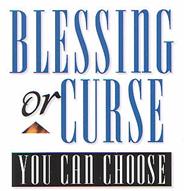Re’eh 5773 – Who would choose a curse?
 “Behold, I set before you today a blessing and a curse;” …Deuteronomy 11:26
“Behold, I set before you today a blessing and a curse;” …Deuteronomy 11:26
God tells us “do these things and you will receive blessings; do these other things and you will receive curses.”
In the opening line of this week’s Torah reading we are not commanded to go the route of blessings. God is giving us advice: do these things and good stuff will follow. You have free will. You can choose.
If it’s not clear enough that we have a choice, later in the book of Deuteronomy God tells us explicitly to choose: “I call heaven and earth to record this day against you, that I have set before you life and death, blessing and cursing; therefore choose life…” (Deuteronomy 30:19).
Doesn’t it seem pretty simple? Who on earth would choose curses over blessings? Yet people do it all the time. People engage in all sorts of self-destructive behaviors that draw curses down on themselves. Taking drugs. Drinking too much. Failing to take care of themselves with exercise and a healthy diet.
And people also do things that draw curses down on themselves in the long run, and harm other people in the short run. Stealing, cheating, abusing other people.
Why? Why do we need God to tell us “choose life?” Why don’t we all automatically choose the blessing?
To understand that, just look at the first word in this week’s parsha. Re’eh. Translated above as “behold,” but more literally translated as “See!”
And that’s the problem. All too often people can’t see. They can’t tell the difference between behavior that’s a blessing and behavior that’s a curse.
When God tells us “See!” she’s telling us to pay attention, think things through. Blessings and curses are sitting in front of you. Pay attention: see which one is which. Really see – look deep, beyond the surface aspects.
As an example, drugs may feel good and seem like a blessing. But if they ruin your ability to make a living, ruin your relationships with others, or cause you to get in trouble with the police, something that you thought a blessing will have revealed its true nature as a curse.
And it works in the other direction as well. Something that might seem like a curse – working hard when you’d rather be goofing off – in the long run may reveal itself as a true blessing as you progress through life and accomplish the things you want to accomplish.
There’s a passage in the Mishnah (Pirkei Avot) that has a bunch of rabbis sitting around discussing what are the good paths to which a person should cleave. R. Shimon’s answer is “see the consequences of your actions.” That’s a major reason so many of us choose curses over blessings: we are incapable of seeing past the short term, to really understand in our hearts the consequences of our actions, so we choose the curse that’s masquerading as a blessing.
Blessings and curses are both in front of us every day. It’s up to us to figure out which is which and make the right choice.

Good insights. I think at times we as a society fail to “see.” For example, the consequences of destroying rain forests for hamburgers, or allowing certain foods or medications on the market too soon without doing adequate research as to how harmful they may be to human beings.
Shalom
Pingback: Nitzavim 5774 -- Choose Life!